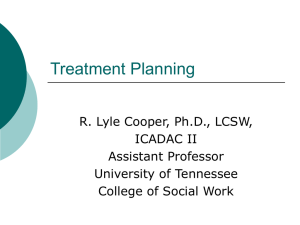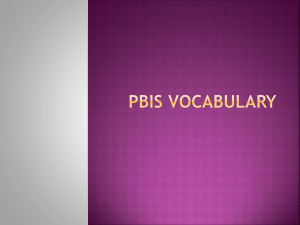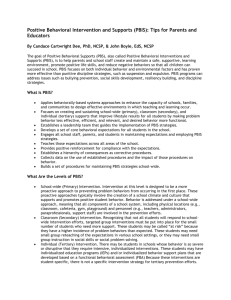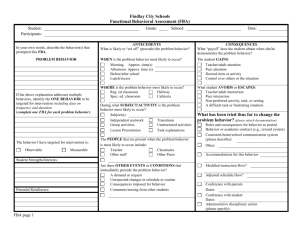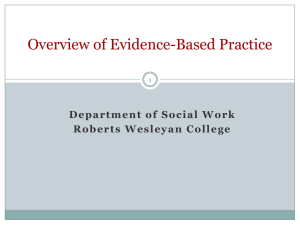Syllabus: Evidence-Based Behavior Management
advertisement
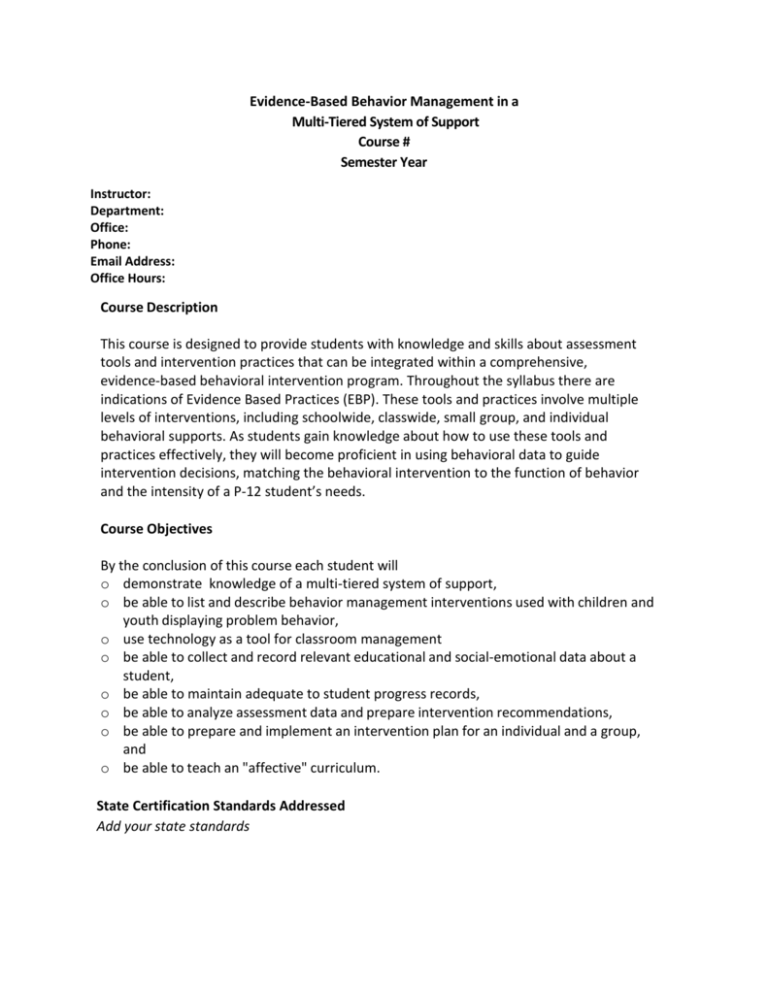
Evidence-Based Behavior Management in a Multi-Tiered System of Support Course # Semester Year Instructor: Department: Office: Phone: Email Address: Office Hours: Course Description This course is designed to provide students with knowledge and skills about assessment tools and intervention practices that can be integrated within a comprehensive, evidence-based behavioral intervention program. Throughout the syllabus there are indications of Evidence Based Practices (EBP). These tools and practices involve multiple levels of interventions, including schoolwide, classwide, small group, and individual behavioral supports. As students gain knowledge about how to use these tools and practices effectively, they will become proficient in using behavioral data to guide intervention decisions, matching the behavioral intervention to the function of behavior and the intensity of a P-12 student’s needs. Course Objectives By the conclusion of this course each student will o demonstrate knowledge of a multi-tiered system of support, o be able to list and describe behavior management interventions used with children and youth displaying problem behavior, o use technology as a tool for classroom management o be able to collect and record relevant educational and social-emotional data about a student, o be able to maintain adequate to student progress records, o be able to analyze assessment data and prepare intervention recommendations, o be able to prepare and implement an intervention plan for an individual and a group, and o be able to teach an "affective" curriculum. State Certification Standards Addressed Add your state standards Course Text(s) Alberto, P. and Troutman, A. (2012). Applied Behavior Analysis for Teachers, 9th Edition. Columbus, Ohio: Pearson Publishing. Algozzine, R., Daunic, A. P., & Smith, S. W. (Eds.). (2010). Preventing problem behaviors: Schoolwide programs and classroom practices (2nd edition). Thousand Oaks, CA: Corwin Press. The instructor will assign additional readings. Alter, P. J., & Conroy, M. A. (n.d.). Preventing challenging behavior in young children: Effective practices. Center for Evidence-Based Practice: Young Children with Challenging Behavior. Retrieved from http://challengingbehavior.fmhi.usf.edu/do/resources/documents/rph_preventing_challenging_beh avior.pdf Flannery, K. B., & Sugai, G. (Eds.). (2009). School-wide PBIS implementation in high schools: Current practice and future directions. University of Oregon. Retrieved from http://www.pbis.org/common/pbisresources/publications/HighSchoolMonograph.pdf Florida's Positive Behavior Support Project. (2011). Implementing a multi-tiered system of support for behavior: A practical guide. University of South Florida. Retrieved from http://flpbs.fmhi.usf.edu/pdfs/RTIB%20Guide%20101811_final.pdf Sugai, G., Horner, R. H., Algozzine, R., Barrett, S., Lewis, T., Anderson, C., Bradley, R., Choi, J. H., Dunlap, G., Eber, L., George, H., Kincaid, D., McCart, A., Nelson, M., Newcomer, L., Putnam, R., Riffel, L., Rovins, M., Sailor, W., Simonsen, B. (2010). School-wide positive behavior support: Implementers' blueprint and self-assessment. Eugene, OR: University of Oregon. Retrieved from http://www.pbis.org/pbis_resource_detail_page.aspx?Type=4&PBIS_ResourceID=713 Websites PBIS The OSEP Technical Assistance Center on Positive Behavioral Interventions and Supports (PBIS) http://www.pbis.org/default.aspx This website offers resources, examples, presentations, and research on PBIS. Resources are organized by topic and audience. NCII The National Center on Intensive Interventions (NCII) http://www.intensiveintervention.org/ Key resources: Data-Based Individualization: A Framework for Intensive Intervention http://www.intensiveintervention.org/sites/default/files/DBI%20a%20Framework%20f or%20Intensive%20Intervention.pdf DBI training series http://www.intensiveintervention.org/content/dbi-training-series o Introduction to Data-Based Individualization (DBI): Considerations for Implementation in Academics and Behavior (DBI Training Series Module 1) http://www.intensiveintervention.org/resource/introduction-data-basedindividualization o Monitoring Student Progress for Behavioral Interventions (DBI Training Series Module 3) http://www.intensiveintervention.org/resource/monitoring-studentprogress-behavioral-interventions-dbi-training-series-module-3 o Using FBA for Diagnostic Assessment in Behavior (DBI Training Series Module 6) http://www.intensiveintervention.org/resource/using-fba-diagnosticassessment-behavior-dbi-training-series-module-6 o Designing and Delivering Intensive Intervention in Behavior (DBI Training Series Module 8) http://www.intensiveintervention.org/resource/designing-anddelivering-intensive-intervention-behavior-dbi-training-series-module-8 Tools Charts. Ratings of the scientific rigor of commercially available tools and interventions that can be used as part of a data-based individualization program. http://www.intensiveintervention.org/resources/tools-charts IRIS The IRIS Center http://iris.peabody.vanderbilt.edu/ Key resources Behavior and classroom management resources http://iris.peabody.vanderbilt.edu/irisresource-locator/?term=behavior-classroom-management Evidence-Based Practice Summaries http://iris.peabody.vanderbilt.edu/ebp/ Assignments Readings and Class Participation The readings assigned for each class must be completed before class. You are expected to discuss the main ideas of each reading, how you could apply the information to in your school setting, and questions/comments you may have. Functional Behavior Assessment Project This project requires that students, in the field placement, design and complete a functional behavior assessment, evidence-based (using relevant research) behavior intervention/support plan, and recommendations/summary for a student in the class who is demonstrating challenging behavior. Keep in mind, the behavior might not be externalizing, but interferes with the student’s learning and participation in the classroom/school community. Components will be submitted at different points throughout the semester and a final complete report (in APA 6th edition format) will be submitted. EBP: Encouragement of Appropriate Behavior, Behavior Reduction Strategies FBA Presentation Students will develop a professional presentation to share their FBA project in a conference poster session format. Tests Two tests will be given during this semester. Both tests will include multiple choice and application response questions. Test content will be taken from assigned readings and course presentations. Evaluation Students can earn up to 300 points. Readings and Class Participation 60 points: 14 @ 5 points each FBA 25 points Behavior Intervention/Support Plan 25 points Final Report with 50 points Recommendations/Summary FBA Presentation 40 points Tests 100 points: 2 @ 50 points each TOTAL 300 Add your institution’s grading scale University Statements Add applicable policies for your institution. Diversity Disability Accommodations Student Confidentiality Week 1 Topic Introduction/Course Overview School- Wide Behavior Management: PBIS & MTSS EBP: Schoolwide Behavioral Expectations Assignments/Tasks AD&S Ch. 1, 3 Behavioral Objectives EBP: Classroom Rules & Routines Collecting Behavioral Data EBP: Encouragement of Appropriate Behavior A&T Ch. 1-3 Functional Behavior Assessment & Functional Analysis EBP: Behavior Reduction Strategies Approaches to Intervention EBP: Encouragement of Appropriate Behavior, Behavior Reduction Strategies A&T Ch. 6-7 AD&S Ch. 4 Introduction of Student and Target Behavior 6 Test 1 Test 1 7 Universal Interventions EBP: Encouragement of Appropriate Behavior, Behavior Reduction Strategies AD&S Ch. 5, 10 8 Supplemental Interventions EBP: Encouragement of Appropriate Behavior, Behavior Reduction Strategies AD&S Ch. 6-7 FBA 9 Intensive Interventions EBP: Encouragement of Appropriate Behavior, Behavior Reduction Strategies AD&S, Ch. 8, 11 10 Reinforcement & Shaping EBP: Encouragement of Appropriate Behavior A&T 8-10 11 Extinction, Generalization, & Maintenance EBP: Encouragement of Appropriate Behavior A&T Ch. 11-12 BIP 12 Punishment & Coercion 13 Professional and Ethical Behavior Management AD&S Ch. 12 14 FBA Poster Session Presentations FBA Presentations 15 Test 2 Test 2 FBA Projects 2 3 4 5 A&T Ch. 4-5

